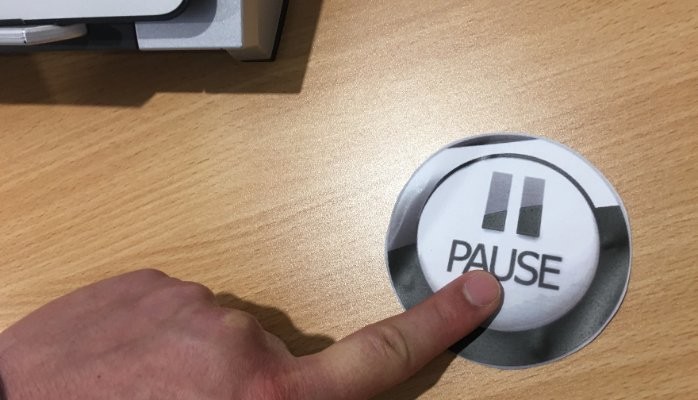ARE YOU CAUGHT UP IN THE BUSYNESS TRAP? If you’re struggling to find focus and wish to get a better grip over your leadership, energy levels and productivity, here are a few tips that may help you.
One of my clients, a project leader with close to 100 reports at one of Ottawa’s leading health institutions recently shared something that will probably resonate with you: her days were plagued with back-to-back meetings, additional follow-up meetings and consultations, resulting in frenzy, loss of productivity and the nagging feeling she was not attending to the real work she’d been hired for.
And the more team meets she attended, the less she felt she was actually being productive and accomplishing anything meaningful.
Sound familiar?
This constant busyness is a recurring pattern I see in so many leaders nowadays. It’s no wonder people are stressed, frazzled and unable to get work done!
And since my client wanted to stem the tide of busyness and gain greater clarity in her leadership, as well as a more effective way of working and managing her energy we set out to get to the bottom of it all and find a workable strategy.
Part of our process is what I’m sharing with you today, so that you too, in case you’re one of those busy over-achievers, can get a better grasp over the temptation to over-commit yourself and gain greater self-command.
Step 1 – Recognize your beliefs
You’d be surprised at some of the beliefs that underpin and fuel compulsive busyness. I invite you to pause for a moment and consider what beliefs may be giving rise to the need to say ‘Yes’ to everything. Here are examples:
- Busyness is status quo. Nothing I can do about it.
- I’m on this hamster wheel and don’t know how to get off
- I don’t want to deal with my anger, frustration, sorrow and pain. It’s easier to be busy.
- I need to help others. They can’t do without me.
- I need to do everything myself. Others are incompetent!
- Idleness = Laziness | Busyness = Productivity
- The busier I am, the more recognition, status and love I will gain.
- I’m not good enough
- Busyness is measurable output – pausing and self-care are not.
- I love being busy!
Do some of these resonate with you? Once your beliefs come into focus, you can call them out. Once you name them, you can move on to the next step.
Step 2 – Ask yourself “What am I saying ‘no’ to?”
One of the questions I asked my client was “ When you say ‘Yes’ to all the meetings, consultations, feedback sessions, etc., what are you saying ‘NO’ to?”.
Here were some of her answers:
- Time to think strategically on how to move the organization forward
- Time to envision and ideate
- The ability to empower others to become more autonomous without constant scrutiny and participation
- Clarity
- Quality time with her family
- Presence and energy for her family
- Time to recharge
This was quite a revelation. Saying ‘Yes’ in a well-meaning way to all the busyness was not helping her become a more productive and supportive leader. On the contrary, it was robbing her of the ability to see the bigger picture, undermining her own productivity and preventing her staff from becoming more self-sufficient.
In the end, it was costing people vast amounts of energy and time.
So, at what expense are you saying ‘Yes’ to meetings, projects, collaborations? What are you therefore saying ‘No’ to?
3. Look at your calendar and colour-code it, according to things that give you energy (green) and those that zap your energy (red). If there’s too much red, recheck the beliefs you identified earlier and start saying ‘no’ and setting healthy boundaries around your energy vampires.
To support you, I highly recommend using the Energy Calendar by Mike Poskey (CEO or Zerorisk HR), a great tool to help you visualize your day/week according to energy investment.
In the end, my client was willing to do the deep work around beliefs, recognize what she was saying ‘no’ to and reset her calendar to incorporate the much-needed time around ideation, strategizing and breaks (yes, breaks!)
According to her, it’s still a work in progress, but at least, she feels in better control of her work load and that her productivity has improved. Most importantly, as a leader, she’s setting the stage for a systemic change around greater autonomy with her staff, which is significant and will continue to have positive ramifications.
So, are you ready and willing to relinquish the allure of the busyness trap so that you too can you gain greater control over your life? You might be surprised that by doing less, you can actually accomplish more.




